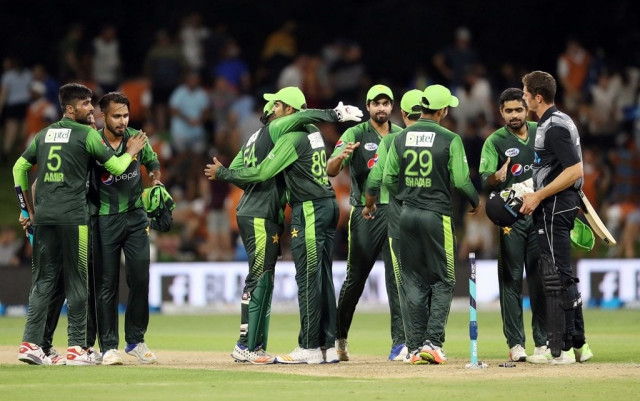The perfect marriage of Pakistan and T20Is
Pakistan are more capable of producing all-consuming bursts of pure inspiration than any other team in the world

PHOTO: AFP
Pakistan’s unpredictability is one of the constants in the world of cricket, to the point that they are predictably so. Discussing the same — either to exalt or to condemn — is now almost a repetitive exercise.
And yet here they stand, the number one T20I side in the world. Surely then, there is at least some method to their madness. Or perhaps that is why they thrive so much in T20Is; the shortest format of the game is much more accommodating to their brand of lunacy.
Pakistan reinforce their unpredictability
Pakistan were the only team to reach the semi-final of the World T20 in the first four editions. They won one out of those four. In one they were one shot away from claiming the title while in another it took arguably the greatest T20I innings ever to deny them the title; for more details, talk to Messrs Misbahul Haq and Michael Hussey.
T20Is award not endurance but flash and in those conditions Pakistan thrive.
Perhaps it has to do with the bowlers that Pakistan have had at their disposal. Three of the top four most successful T20I bowlers are from Pakistan. Shahid Afridi’s 97 wickets see him top that particular list, while Umar Gul and Saeed Ajmal are joint third with 85 wickets apiece. Lasith Malinga’s 90 wickets have broken the Pakistan trio’s long-held stranglehold of the top three spots. All three were capable of winning matches on their own; put them in one team and you have a readymade recipe for success.
Shadab, Zaman star as Pakistan clinch T20I series
Perhaps it is because Pakistan are more capable of producing all-consuming bursts of pure inspiration than any other team in the world. These bursts, by definition, last a frustratingly brief time. In the two longer formats, teams look to survive those bursts and then recover the resulting damages during the remaining course of the match. In T20Is, there isn’t enough time to do so. By the time the Pakistan whirlwind subsides, it’s often too late to pick up the pieces. And so it leaves behind a plethora of ruin in its path.
Pakistan receive praise for fightback, claiming top T20I spot
Perhaps it is because the short nature of T20Is leaves teams with little time to do anything. Little time to think, lesser time to overthink and even lesser time to mess up due to overthinking. Pakistan cricket works best on instincts and in T20Is their instincts are unleashed to devastating effect.
Perhaps it is because lapses in concentration in T20Is are not as badly punished as they are in Tests and even ODIs, where a dropped catch or a poor shot can be far more costly.
Babar claims top spot in T20I rankings
Perhaps it is because T20I is much more similar to the kind of cricket Pakistanis grow up playing. The skills learned on the streets are just as applicable there as they are when playing a T20I at the Eden Park.
In all likelihood, Pakistan’s success is a mixture of all those factors coming together at different points in the game to produce some of the most memorable moments the shortest format has so far seen.
Pakistan have always been the bad boys of cricket; possessing neither a strong academic background nor the will to work particularly hard. Yet they are nobody’s fool. And on Sunday, they became the masters of the format so suited to them that it may as well have been tailored for them alone.



















COMMENTS
Comments are moderated and generally will be posted if they are on-topic and not abusive.
For more information, please see our Comments FAQ